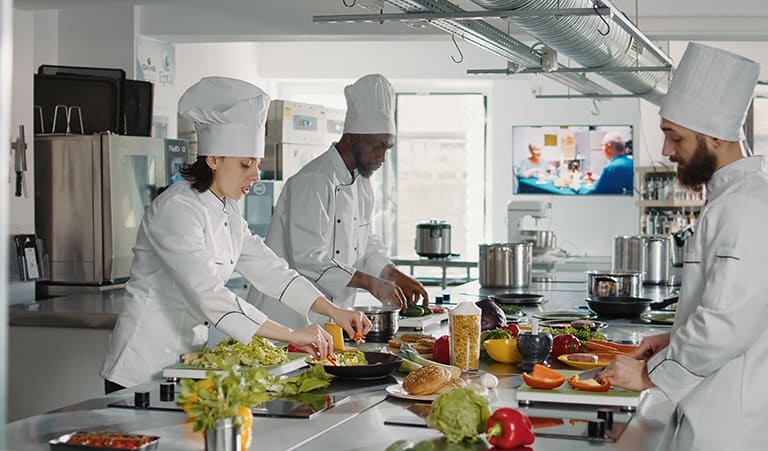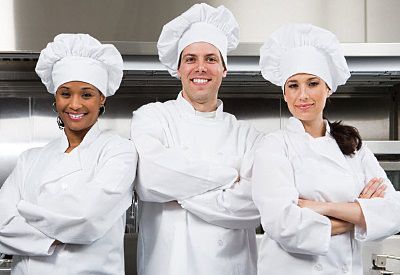A kitchen team is a group of individuals working together to prepare meals in a restaurant or catering setting. They collaborate to ensure smooth kitchen operations, timely food preparation, and high-quality dishes for customers.
They have different roles such as chefs, sous chefs, line cooks, prep cooks, and dishwashers, each responsible for specific tasks in the kitchen. The chefs oversee the entire kitchen, create menus, and coordinate with the front of house staff. Sous chefs assist the chefs and take charge in their absence.
Line cooks and prep cooks handle the actual cooking and preparation of food, while dishwashers clean and maintain the kitchen area. Effective communication, teamwork, and culinary skills are crucial for a successful kitchen team. By working together harmoniously, they strive to deliver exceptional dining experiences to customers.

Credit: www.glimpsecorp.com
Importance Of A Kitchen Team
A highly efficient kitchen team is crucial for smooth workflow, resulting in high-quality output. The team’s coordination and cooperation are essential in ensuring a seamless operation. Each member plays a vital role, contributing to the overall success of the kitchen.
From the chef delegating tasks to the line cooks and dishwashers executing them, every step must be coordinated effectively. This ensures that food is prepared and served efficiently, minimizing delays and maximizing customer satisfaction. Communication and teamwork go hand in hand, allowing the team to work together seamlessly.
By maintaining an efficient workflow, the kitchen team can produce top-notch dishes and provide a memorable dining experience for customers.
Roles And Responsibilities Within A Kitchen Team
A kitchen team consists of various roles and responsibilities, each crucial to smooth operations. The sous chef oversees the kitchen, assisting the head chef and ensuring food quality. Line cooks are responsible for cooking and preparing specific dishes. The pastry chef specializes in creating desserts, pastries, and breads.
Dishwashers play an essential role in maintaining cleanliness by cleaning dishes, utensils, and equipment. Each member of the kitchen team contributes to the overall success and efficiency of the kitchen. Their combined efforts result in delicious meals and a well-functioning culinary establishment.
It is important for each team member to understand their role and responsibilities to maintain a harmonious workflow.
Qualities And Skills Of An Effective Kitchen Team
An effective kitchen team exhibits qualities such as clear communication, efficient time management, adaptability, and strong leadership skills. Open and effective communication is vital in a kitchen setting to ensure smooth operations and avoid miscommunication. Prioritizing tasks and managing time efficiently is crucial to meet the demands and deadlines in a fast-paced kitchen environment.
A successful kitchen team must be adaptable to changing circumstances and be able to handle unexpected situations with ease. Additionally, strong leadership skills are necessary to guide the team, delegate tasks, and motivate team members towards achieving their goals. These qualities and skills contribute to the overall efficiency and success of a kitchen team, ensuring a seamless and satisfying dining experience for customers.
Developing Strong Teamwork In The Kitchen
Developing strong teamwork in the kitchen requires regular communication among the kitchen team members. Constantly updating each other about tasks and progress helps to streamline operations. Team building activities play a vital role in encouraging collaboration and fostering a sense of unity within the team.
From icebreaker games to group challenges, these activities boost morale and improve communication among team members. Encouraging collaboration is another key aspect of building a strong kitchen team. Creating an environment where everyone feels comfortable sharing ideas and working together enhances productivity and efficiency.
Team members should be encouraged to seek input from one another and work collectively towards achieving common goals. Overall, effective communication, team building activities, and a culture of collaboration are essential in developing a strong kitchen team.
Challenges In Managing A Kitchen Team
Managing a kitchen team brings several challenges. The stress and pressure can be overwhelming, with high stakes and tight timelines. Conflict resolution is crucial in maintaining a harmonious environment. It’s important to address issues promptly and find suitable solutions. Staff retention and training are also vital, as a well-trained and motivated team is necessary for success.
Providing opportunities for growth and development can help retain employees and enhance their skills. Effective communication plays a key role in managing a kitchen team, ensuring that everyone is on the same page and objectives are clear. Overall, successfully managing a kitchen team requires strong leadership, effective communication, and the ability to handle challenges head-on.
So, it’s imperative to address these challenges proactively to create a productive and cohesive kitchen team.
Frequently Asked Questions
What Is A Kitchen Team?
A kitchen team refers to a group of individuals working together in a kitchen environment to prepare and cook meals. They collaborate and specialize in various tasks, such as food preparation, cooking, baking, plating, and ensuring the smooth operation of the kitchen.
What Are The Roles In A Kitchen Team?
The roles in a kitchen team typically include a head chef, sous chef, line cook, pastry chef, and kitchen assistants. Each role has specific responsibilities such as overseeing the kitchen, managing food stations, preparing ingredients, creating recipes, and maintaining cleanliness and organization.
Why Is Teamwork Important In A Kitchen Environment?
Teamwork is crucial in a kitchen environment as it ensures efficiency, productivity, and a smooth operation. By working together, kitchen teams can handle high-pressure situations, meet deadlines, and deliver quality dishes. Effective communication and coordination amongst the team members are essential for success.
How Do Kitchen Teams Maintain Food Safety And Hygiene?
Kitchen teams uphold food safety and hygiene by following proper sanitation practices, maintaining clean workstations, handling and storing food correctly, adhering to hygiene regulations, ensuring proper cooking temperatures, and regularly inspecting and cleaning kitchen equipment. These measures prevent foodborne illnesses and maintain high standards of cleanliness.
What Skills Are Required To Be Part Of A Kitchen Team?
To be part of a kitchen team, individuals should possess skills such as culinary expertise, knowledge of food safety regulations, time management, effective communication, multitasking, attention to detail, creativity, teamwork, and adaptability. These skills enable team members to work efficiently and produce quality meals.
Conclusion
A kitchen team plays a vital role in ensuring a smooth and efficient operation of any kitchen. From chefs to sous chefs, line cooks to prep cooks, everyone contributes their skills and expertise to create culinary masterpieces. The team’s synergy and coordination are crucial in maintaining high standards of quality and customer satisfaction.
Communication and collaboration are key, as well as a shared passion for food. A well-functioning kitchen team understands the importance of organization, time management, and flexibility to adapt to unexpected challenges. By working together, they can overcome obstacles and deliver exceptional dining experiences.
Each team member brings their unique strengths and talents, which ultimately create a harmonious blend of flavors and techniques. So, whether you’re a professional chef or a home cook, remember the power of a strong kitchen team and the magic they can create in the heart of any gastronomic pursuit.

Leave a Reply